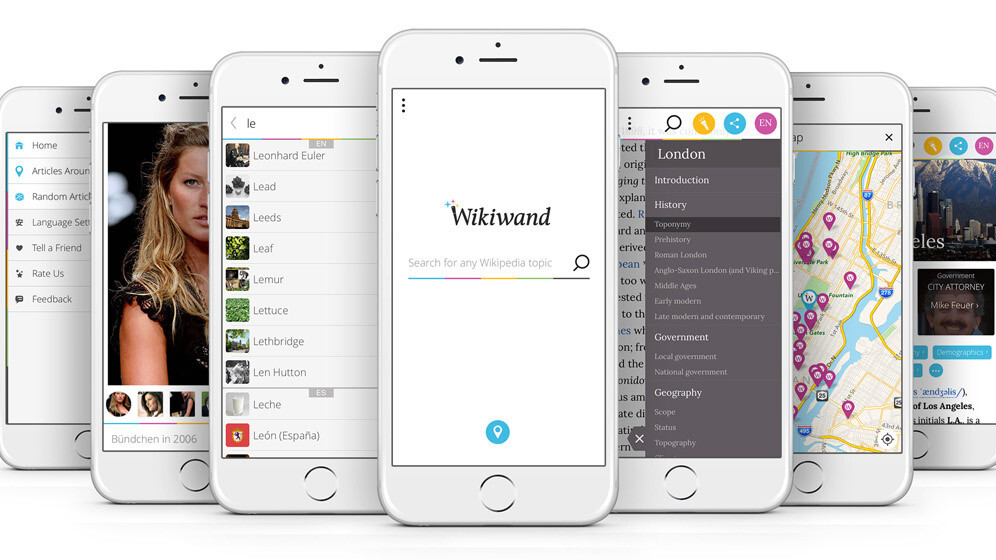
Wikiwand made a name for itself in 2013 adding a streamlined interface and useful features to Wikipedia via a browser extension. The company has since raised $600,000 in funding, launched an iPhone app and has an Android version in the works.
TNW spoke with founder Lior Grossman to find out about Wikiwand’s approach to designing a more usable encyclopedia, and making money off Wikipedia’s Creative Commons-licensed content.
How did you go about translating the Wikiwand Web experience to mobile?
We began by researching how people are using Wikipedia on mobile, as opposed to on the Web. We soon found that while people use Wikipedia on the Web for research, learning, work and studying, on mobile they use Wikipedia as a quick reference tool: to get immediate answers, settle disputes between friends, quickly learn about the world around them, and look up information about actors, musicians and movies.

The next step was envisioning the perfect knowledge-consumption experience for mobile users. Essentially, we were not adapting the Wikiwand web interface to mobile, but we were actually creating a new mobile experience altogether. Shrinking the Wikipedia website and wrapping it in a mobile app doesn’t cut it anymore — people prefer a true mobile experience.
On the web, most people reach Wikiwand using Google search, by simply installing our browser extension — which means that they don’t have to use the search function often. However, on mobile, the experience always starts with a Wikiwand search!

We’ve designed a mobile-friendly search experience that provides the most accurate results possible. In addition, we equipped the iPhone app with a much-needed in-article search capability.
The Wikiwand article display was designed from scratch for the mobile user’s needs. Articles start with a beautiful full-bleed cover photo (originally introduced in Wikiwand and later adopted by Wikipedia’s Android app).
Since many users just want a quick peek, we designed a quick facts panel that shows the most relevant facts about any topic. For convenience, we also included links to maps, gallery and the top sections within the article. We also added a table-of-contents button that is always accessible, as well as a fixed header showing the current section read.
What’s the next step for Wikiwand after launching on iOS and soon on Android?
We plan to introduce exciting new features across our Web and mobile apps. On the mobile front, we’re looking to make access to information even faster — similar to what we did with the quick facts panel.
On the web front, we’re about to add more personalization options so you can customize Wikiwand to your taste. We also plan to equip our Chrome, Firefox and Safari extensions with a more powerful preloading mechanism for quicker browsing.
In addition, we’ve started partnering up with other apps and publishers to integrate the powerful Wikiwand search and article-display within other products.
How do you intend to monetize Wikiwand’s apps?
We’re experimenting with various monetization options at the moment.
One way is showing contextually relevant products and services – for example, if one searches for a band, we might offer to purchase the album. If one searches for a company, we might offer career opportunities. Obviously, those offers will be clearly separated from the content.

We’re still considering the freemium route, offering a premium version of Wikiwand that is both ad-free and contains additional power features. In any case, the basic product will always be free and open to the public.
Won’t traditional methods like charging for the apps or running ads go against Wikipedia’s Terms of Service, or at the very least, affect your relationship with the Wikimedia Foundation?
The content in Wikipedia is distributed under a Creative Commons license that allows it to be used commercially. Actually, many commercial companies use content from Wikipedia, for example Google (search results) and Facebook (community pages). This is absolutely above board, as Wikipedia’s mission is to disseminate human knowledge, not to own it.
Wikiwand has the same mission as Wikipedia, but we take a different approach towards product, design and business. We may have disagreements as to what’s the right way to do this, but that is perfectly okay, since eventually we work towards the same goal: providing people worldwide with an easy access to human knowledge.
Get the TNW newsletter
Get the most important tech news in your inbox each week.





